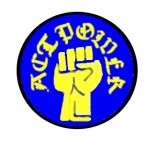 DPF published two posts yesterday about prominent lefties comparing righties to fascists: Minto comparing Bush to Hitler and Amin, and Carter comparing Key to Mussolini. I agree with him that both comparisons are entirely unjustified, and do a great disservice to political discourse in this country.
DPF published two posts yesterday about prominent lefties comparing righties to fascists: Minto comparing Bush to Hitler and Amin, and Carter comparing Key to Mussolini. I agree with him that both comparisons are entirely unjustified, and do a great disservice to political discourse in this country.
But without taking away from that, let’s not forget that David, his commentariat, his blogging cohort and indeed some of his ideological allies have spent most of the past decade making political hay by comparing Helen Clark to various dictators. David was central to the Free Speech Coalition whose billboards protesting the Electoral Finance Act evoked Mao Zedong and Frank Bainimarama; he wrote a weekly column entitled ‘Dispatch from Helengrad’, perpetuating the Clark=Stalin syllogism; his blog permits and tacitly endorses the almost daily comparison of left-wing political figures to tyrants; his closest blogging acquaintance Cameron Slater has constructed his political profile almost entirely of such cloth. The National and ACT parties themselves have a very large portfolio of such comparisons — from the Young Nats publishing the famous image above, to Heather Roy talking about the Clark government’s ‘feminazi’ welfare agenda to Bill English’s frequent comparisons of the Clark government to the Mugabe regime in Zimbabwe, both in the House and in the media. And how could I forget John Banks — former National party cabinet minister and now Citizens & Ratepayers Mayor of Auckland — whose public comparisons of Clark to Hitler, Stalin, Mao and Pol Pot and references to her as the ‘Chairman of the Central Committee’ among others only ceased when he decided to run for Mayor and they were no longer politically tenable. To say nothing of the foaming of various branches of the libertarian and objectivist movements, who are admittedly further from National than Labour are, but nevertheless have been occasional allies of convenience. Although typically less egregious than Carter’s and Minto’s comparisons, these are all the same in principle. The difference is one of magnitude, not of type. And the very worst examples of the type are exclusively from the right.
I should imagine that many of those who engaged in these sorts of attacks on Clark and her government but who are wide-eyed with mock outrage now that the shoe is on the other foot believe (to themselves if not in public) that the former comparisons were rooted in reality, while these latter are not and so are not justified. This demonstrates a phenomenal absence of political or historical perspective: Clark, like Bush, was removed peacefully from office by the ordinary process of democratic action, and the comparison of their programmes with those of the named dictators simply does not bear comparison, and it is disrespectful to history to draw it. David is right to point out that Labour are wrong for stooping to the level of National and ACT and their less-savoury constituents, but that does not erase the initial wrongness which spawned it, and in which he played a role.
L
[Edited to add Banksie and the libertarians to the list of offenders, and add the image at top.]

